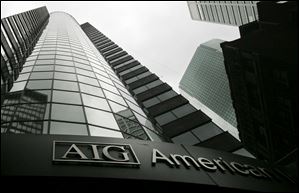
AIG reaches deal to repay billions from U.S. bailout
10/1/2010
American International Group was undone in the complex derivatives and securities market, not its traditional insurance.
NEW YORK - American International Group Inc., which became a lightning rod for criticism over government bailouts, said it reached a deal to repay billions of dollars it received during the credit crisis.
The plan announced Thursday could return a profit to taxpayers who footed the bill for AIG's near collapse in September, 2008.
"This is a pivotal milestone as we deliver on our long-standing promise to repay taxpayers," Robert Benmosche, AIG's chief executive officer, said in a statement. "We are very pleased that this agreement vastly simplifies current government support of AIG."
The announcement provides a clearer strategy to repay AIG's debt to the government.
Under the plan, the U.S. Treasury Department will swap preferred shares it holds in AIG for common stock and sell those shares over time. AIG also will repay loans it received from the Federal Reserve Bank of New York as part of the deal.
As of June 30, AIG had $132.1 billion in outstanding aid from the government, including $49.1 billion in Treasury Department loans. The new shares will give the Treasury a 92.1 percent AIG stake before it begins selling shares.
New York-based AIG was one of the financial companies hardest-hit by the credit crisis and received the largest government bailout. It received a bailout package worth as much as $180 billion from the government, which received an 80 percent stake in the company in return.
AIG was severely criticized for paying bonuses to employees after the bailout, including employees in the division that nearly destroyed the company.
The government rescued AIG because the insurer worked with hundreds of financial institutions throughout the world.
The government could lose money elsewhere. As part of the bailout, the government took over some of AIG's risky investments, and is exposed to potential losses related to them.